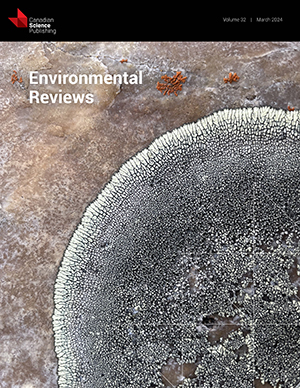Review of Climate Change Adaptation and Mitigation Implementation in Canada’s Forest Ecosystems Part I: Reporting, Science and institutional/governance supporting practices in Canada
IF 5.1
3区 环境科学与生态学
Q1 Environmental Science
引用次数: 0
Abstract
Canada is recognized as a global leader in sustainable forest management. Canadian forests and the forest sector remain vital pillars of the Canadian economy and home to many rural and remote communities. However, climate change is an existential threat to the sustainability of forests and forest-dependent communities. While both direct and indirect threats posed by climate change to Canada’s forest sector are now well understood, our understanding of specific forest practices that have emerged from the body of science to mitigate and adapt to climate change impacts is not well documented. Through a review of the scientific and grey literature, this paper expands our knowledge and operational gaps associated with implementing climate change adaptation and mitigation practices in Canadian forests. The study found a dearth of literature specifically dedicated to reporting on the type of forest practices currently in use across Canada to address mitigation and adaptation. Most reports or studies were published in 2019 or later, with federal and provincial governments being the dominant actors in reporting and monitoring, research, and funding. Across the 15 terrestrial ecozones in Canada, forest practices linked to climate change were reported in 12 ecozones, with most practices reported in the Montane Cordillera located in western Canada. Common forest practices reported include fuel management, assisted migration, enhanced silvicultural activities, and carbon offset projects. We conclude that climate change adaptation/mitigation practices in Canada are in their early stages of implementation. Many practices remain in experimental stages (e.g., genetic trials) or are implemented at a relatively small scale in Canada (e.g., climate-based seed transfer, carbon reserves). The literature suggests that the most mainstream practices associated with climate change mitigation in Canada include tree planting for carbon sequestration and the designation of protected areas to enhance ecosystem resilience. We conclude that despite increasing reports linking climate change benefits with reported forest practices, the reporting in the scientific literature is scarce, poorly reported, and often not grounded in credible evidence.审查加拿大森林生态系统适应和减缓气候变化的实施情况。第一部分:加拿大的报告、科学和机构/治理支助做法
加拿大被公认为可持续森林管理的全球领导者。加拿大森林和森林部门仍然是加拿大经济的重要支柱,也是许多农村和偏远社区的家园。然而,气候变化对森林和依赖森林的社区的可持续性构成了生存威胁。虽然气候变化对加拿大森林部门造成的直接和间接威胁现在已得到充分了解,但我们对减轻和适应气候变化影响的科学体系中出现的具体森林实践的理解并没有得到很好的记录。通过对科学文献和灰色文献的审查,本文扩大了我们在加拿大森林实施气候变化适应和减缓做法方面的知识和业务差距。该研究发现,缺乏专门用于报告加拿大各地目前使用的森林实践类型的文献,以解决缓解和适应问题。大多数报告或研究都是在2019年或之后发表的,联邦和省政府是报告和监测、研究和资助的主要参与者。在加拿大的15个陆地生态区中,有12个生态区报告了与气候变化相关的森林实践,其中大多数实践报告发生在加拿大西部的山地科迪勒拉。报告的常见森林做法包括燃料管理、辅助迁移、加强造林活动和碳抵消项目。我们的结论是,加拿大适应/减缓气候变化的做法正处于实施的早期阶段。许多做法仍处于试验阶段(例如,基因试验)或在加拿大以相对较小的规模实施(例如,基于气候的种子转移、碳储备)。文献表明,在加拿大,与减缓气候变化有关的最主流做法包括植树以固碳和指定保护区以增强生态系统的复原力。我们的结论是,尽管越来越多的报告将气候变化的益处与报告的森林实践联系起来,但科学文献中的报告很少,报道不充分,而且往往没有可靠的证据。
本文章由计算机程序翻译,如有差异,请以英文原文为准。
求助全文
约1分钟内获得全文
求助全文
来源期刊

Environmental Reviews
ENVIRONMENTAL SCIENCES-
CiteScore
9.80
自引率
3.50%
发文量
45
审稿时长
>12 weeks
期刊介绍:
Published since 1993, Environmental Reviews is a quarterly journal that presents authoritative literature reviews on a wide range of environmental science and associated environmental studies topics, with emphasis on the effects on and response of both natural and manmade ecosystems to anthropogenic stress. The authorship and scope are international, with critical literature reviews submitted and invited on such topics as sustainability, water supply management, climate change, harvesting impacts, acid rain, pesticide use, lake acidification, air and marine pollution, oil and gas development, biological control, food chain biomagnification, rehabilitation of polluted aquatic systems, erosion, forestry, bio-indicators of environmental stress, conservation of biodiversity, and many other environmental issues.
 求助内容:
求助内容: 应助结果提醒方式:
应助结果提醒方式:


